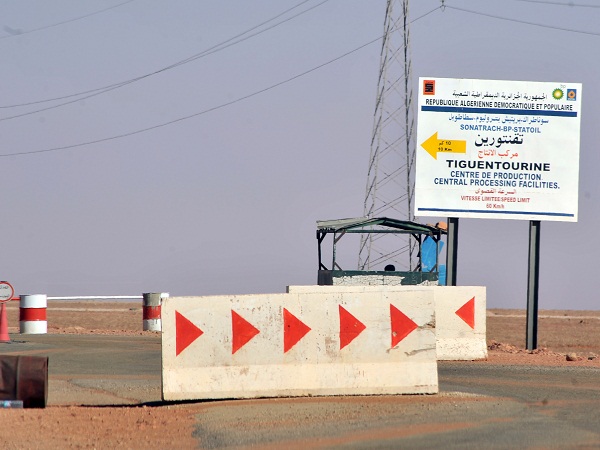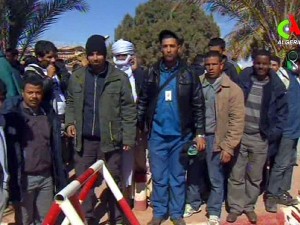Algeria launches ‘final assault’; 7 hostages dead

Roadblocks prevent the access of the Tigentourine gas plant where hostages have been kidnapped by islamic militants, Friday. AP
AIN AMENAS, Algeria—Algeria’s special forces stormed a natural gas complex in the middle of the Sahara desert on Saturday in a “final assault” aimed at ending a four-day-old hostage crisis, the state news agency reported. It said 11 extremists and seven hostages were killed.
The report, quoting a security source, didn’t say whether any hostages or militants remained alive, and it didn’t give the nationalities of the dead. It said the army was forced to intervene after a fire broke out in the plant.
In Manila, the Department of Foreign Affairs earlier Saturday said a still undetermined number of Filipinos remained captive at the site deep in the Sahara near the border with Libya.
The siege at the Ain Amenas plant, jointly run by BP, Norway’s Statoil and Algeria’s state-owned oil company, transfixed the world after radical Islamists stormed the complex, which contained hundreds of plant workers from all over the world.
Algeria’s response to the crisis was typical of the country’s history in confronting terrorists — military action over negotiation — and caused an international outcry from countries worried about their citizens.
The latest deaths bring the official Algerian tally of dead to 19 hostages and 29 militants, although reports on the number of dead, injured and freed have been contradictory throughout the crisis.
The DFA said 34 Filipinos had been evacuated from the gas field and were on their way home.
The militants attacked the plant Wednesday morning. They crept across the border from Libya, 60 miles (100 kilometers) away, and fell on a pair of buses taking foreign workers to the airport. The buses’ military escort drove off the attackers in a blaze of gunfire that sent bullets zinging over the heads of crouching workers. A Briton and an Algerian — probably a security guard — were killed.
Frustrated, the militants turned to the vast gas complex, divided between the workers’ living quarters and the refinery itself, and seized hostages, the Algerian government said. The gas flowing to the site was cut off.
On Thursday, Algerian helicopters opened fire on a convoy carrying both kidnappers and their hostages, resulting in many deaths, according to witnesses.
In their final communications, the militants said they were holding seven hostages: three Belgian, two Americans, a Japanese and a Briton. They had threatened to kill them if the Algerian army attacked.
Algerian authorities estimated that about 30 militants occupied the Ain Amenas site Wednesday and with 18 already reported dead, it appeared Saturday that the hostage crisis was finally over.

Unidentified rescued hostages pose for the media in Ain Amenas, Algeria, in this image taken from television Friday Jan. 18, 2013. Algeria’s state news service says nearly 100 out of 132 foreign hostages have been freed from a gas plant where Islamist militants had held them captive for three days. The APS news agency report was an unexpected indication of both more hostages than had previously been reported and a potentially breakthrough development in what has been a bloody siege. (AP Photo/Canal Algerie via Associated Press TV)
The standoff has put the spotlight on al-Qaida-linked groups that roam remote areas of the Sahara, threatening vital infrastructure and energy interests. The militants initially said their operation was intended to stop a French attack on Islamist militants in neighboring Mali.
The accounts of hostages who escaped the complex highlight the cavalier attitude toward their lives taken by both kidnappers and the military.
Ruben Andrada, 49, a Filipino civil engineer who works as one of the project management staff for the Japanese company JGC Corp., described how Algerian helicopter gunships had earlier opened fire on vehicles carrying hostages and the gunmen who used them as shields.
On Thursday, about 35 hostages guarded by 15 militants were loaded into seven SUVs in a convoy to move them from the housing complex to the refinery, Andrada said. The militants placed “an explosive cord” around their necks and were told it would detonate if they tried to run away, he said.
“When we left the compound, there was shooting all around,” Andrada said, describing the helicopters’ attack. “I closed my eyes. We were going around in the desert. To me, I left it all to fate.”
Andrada said when the vehicle he was in overturned, some of the passengers were able to escape. He sustained cuts and bruises and was grazed by a bullet on his right elbow. He later saw the blasted remains of other vehicles, and the severed leg of one of the gunmen.
The site of the gas plant spreads out over several hectares (acres) and includes a housing complex and the processing site, about a mile apart, making it especially complicated for the Algerians to secure the site and even find where the hostages were being held.
Casualty figures varied widely. The Algerian government now says 19 hostages and 29 militants have died since Thursday. Before the final assault, the militants claimed through the Mauritanian website ANI that the helicopter attack alone killed 35 hostages and 15 militants.
One American, from Texas, is among the dead, and the militants offered to trade two other American hostages for two terrorists behind bars in the US, an offer firmly rejected by Washington. At least one Briton, a Frenchman and Algerians have also died in the standoff. Escaped Algerian workers describe seeing people of many nationalities, including Japanese, shot down.
French Defense Minister Jean-Yves Le Drian said Saturday that there are believed to be no more French hostages in the gas complex. He said the Frenchman killed, Yann Desjeux, was a former member of the French Special Forces and part of the security team. The remaining three French nationals who were at the plant are now free, the Foreign Ministry said.
Statoil CEO Helge Lund said Saturday that there were only six Norwegians unaccounted for, from the 17 at the plant at the time of the attack.
The attack by the Mali-based Masked Brigade had been in the works for two months, a member of the brigade told the online Mauritanian news outlet. He said militants targeted Algeria because they expected the country to support the international effort to root out extremists in neighboring Mali.
The kidnappers focused on the foreign workers, largely leaving alone the hundreds of Algerian workers who were briefly held hostage before being released or escaping.
Several of them arrived haggard-looking on a late-night flight into Algiers on Friday and described how the militants stormed the living quarters and immediately separated out the foreigners.
Mohamed, a 37-year-old nurse who like the others wouldn’t allow his last names to be used for fear of trouble for himself or his family, said at least five people were shot to death, their bodies still in front of the infirmary when he left Thursday night.
Chabane, who worked in food services, said he bolted out the window and was hiding when he heard the militants speaking among themselves with Libyan, Egyptian and Tunisian accents. At one point, he said, they caught a Briton.
“They threatened him until he called out in English to his friends, telling them, ‘Come out, come out. They’re not going to kill you. They’re looking for the Americans,'” Chabane said.
“A few minutes later, they blew him away.” With a report from INQUIRER.net
